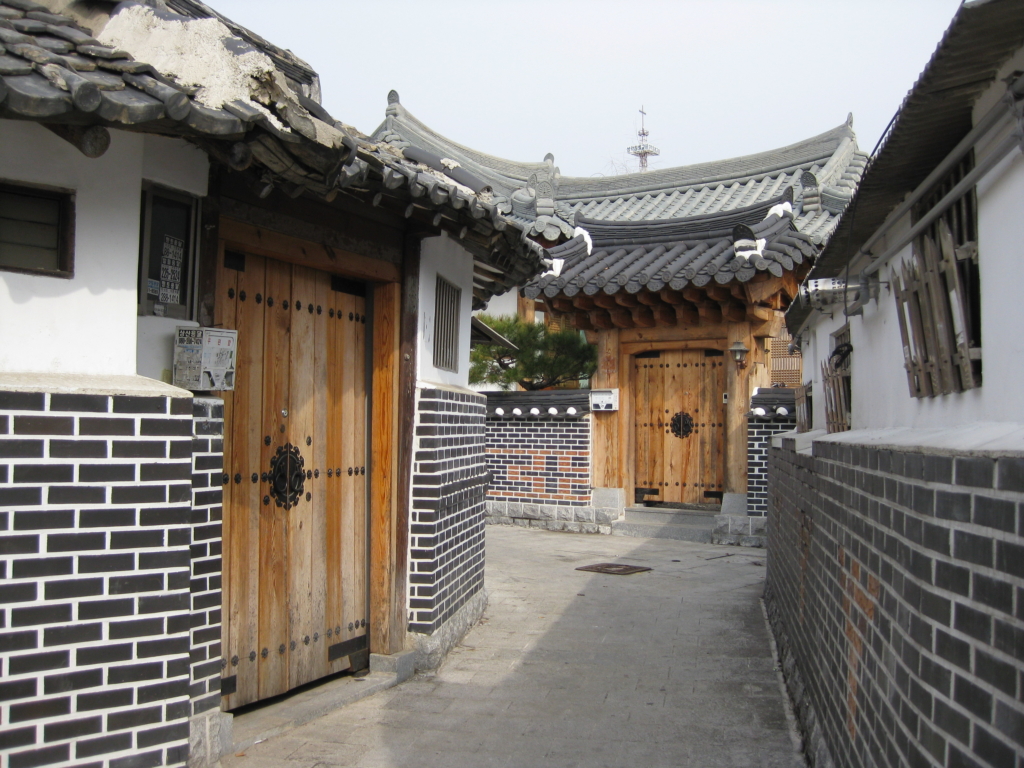Jeonju is a city in South Korea, and the capital of North Jeolla Province. It is an important tourist center famous for Korean food, historic buildings, sports activities and innovative festivals.
In May 2012, Jeonju was indicted as a Creative Cities for Gastronomy as part of UNESCO's Creative Cities Network. This honour recognize the city's traditional home cooking handed down thru generations over thousands of years, its active public and private food research, a system of nurturing talented chefs, and its hosting of distinctive local food festivals.[1]
History
Located in the fertile Honam plain, famous for strawberries and exceptional produce, Jeonju has been an important regional center in the province for centuries. Once, the city was the capital of Hubaekje Kingdom, which was founded by Gyeon Hwon. The city was regarded as the spiritual capital of the Joseon Dynasty because the Yi royal family originated there. The Chŏnju Kim in North Korea, of whom Kim Il-sung was descended from, have their ancestral seat (pon’gwan) in Jeonju as well.
The town was occupied by the Donghak peasants' movement in 1894. Jeonju was given metropolitan status in 1935, and the city was founded in 1949.[citation needed]
In May 2012, Jeonju was indicted as a Creative Cities for Gastronomy as part of UNESCO's Creative Cities Network. This honour recognize the city's traditional home cooking handed down thru generations over thousands of years, its active public and private food research, a system of nurturing talented chefs, and its hosting of distinctive local food festivals.[1]
History
Located in the fertile Honam plain, famous for strawberries and exceptional produce, Jeonju has been an important regional center in the province for centuries. Once, the city was the capital of Hubaekje Kingdom, which was founded by Gyeon Hwon. The city was regarded as the spiritual capital of the Joseon Dynasty because the Yi royal family originated there. The Chŏnju Kim in North Korea, of whom Kim Il-sung was descended from, have their ancestral seat (pon’gwan) in Jeonju as well.
The town was occupied by the Donghak peasants' movement in 1894. Jeonju was given metropolitan status in 1935, and the city was founded in 1949.[citation needed]
[edit] Culture
- Jeonju bibimbap 비빔밥, a traditional local food, is well-known across South Korea. There are also several very popular vegetarian restaurants serving Jeonju style food and pine wine.
- The National Jeonju Museum exhibits ancient relics from the Baekje days.
- There are extensive royal museums, temples, a castle fortress on a hillside, and a well-known paper museum, as well as an annual paper fashion show highlighting both the latest style and traditional Korean clothing made of paper.
- The Jeonju Hanok Village (Hanok Maeul) is a traditional-style village located in the heart of Jeonju, housing over 800 traditional "hanok" style buildings. It contains many traditional tea shops, souvenir shops and restaurants.[2]
- The Jeonju International Film Festival draws about 50,000 visitors annually.
- Jeonju is the hometown of the breakdancing crew Last for One, international Battle of the Year champion.
[edit] People and everyday life
Education is a major industry in the city, but it does not have the manufacturing or heavy industries found in other Korean cities. The local mountains and parks are popular for outdoor recreation due to its rural location. There are also various historical sites in the area. The city also has a zoo, a large park, and the Samsung Sound and Culture Hall, a large, modern concert complex on the Chonbuk National University campus.[edit] Administrative districts
Jeonju is divided into 2 wards, Deokjin-gu (덕진구) and Wansan-gu (완산구), which in turn are divided into approximately 40 neighborhoods.[edit] Attractions
- Jeonju International Film Festival - usually runs from end of April to May for one week annually.[3]
- Central neighbourhood (Wansan District) of Jeonju during Korea under Japanese rule's period
[edit] See also
| Wikimedia Commons has media related to: Jeonju |
[edit] External links
- Jeonju city government home page
- English website aimed at the expatriate community in Jeonju
- Jeonju Hiking & Travel Group
Jeonju Korean traditional village
Last May, I visited Korea. I went sightseeing Seoul and several local tourist attractions. I went to Jeolabuk-do Jeonju-si. I saw Jeonju Korean-style house village. It was awesome.
Jeonju Korean-style house village was built in 1930. There are 543 Korean-style houses. Many foreign and domestic tourists visit the village.
I experienced many activities at Jeonju Korean-style house village, such as traditional weddings, tea ceremony, making bibimbab(Korean traditional dish), building Korean-style houses, making hanji(Korean traditional paper), and crafting with hanji.
The bibimbab had 25 different ingredients. So it was very delicious. Traditional wedding is very different from western weddings. It has a very unique and beautiful atmosphere, which made it special. Moreover, the tour guide explained very well, which made it very easy to understand.
I really recommend Jeonju Korean-style village as 'must-go' tourists spot for my friends.
This is Janet and Shin experienced organiser for your trip to Korea.
Me and My wife are the multi-cultural family
who can speak Malay, Indonesian, English, Cantonese, Mandarin.
Me and My wife are the multi-cultural family
who can speak Malay, Indonesian, English, Cantonese, Mandarin.
Your tour can be arranged from us.
For more information and quotation
Send us email
 RSS Feed
RSS Feed Twitter
Twitter 오후 5:54
오후 5:54
 Unknown
Unknown













0 개의 댓글:
댓글 쓰기